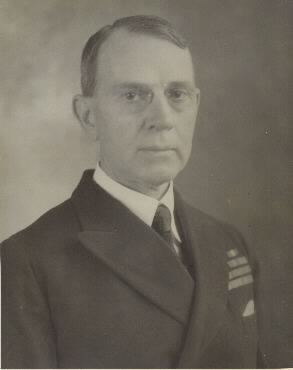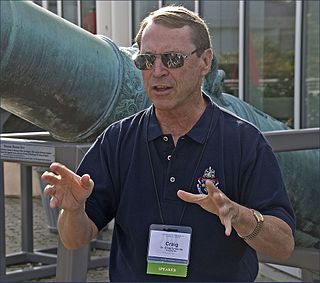William Sheldon Dudley (born 14 July 1936 in Brooklyn, New York, USA) is a naval historian of the United States Navy, who served as Director of Naval History [1] [2] and Director, Naval Historical Center, Washington, D.C. from 1995 to 2004.
William Sheldon Dudley (born 14 July 1936 in Brooklyn, New York, USA) is a naval historian of the United States Navy, who served as Director of Naval History [1] [2] and Director, Naval Historical Center, Washington, D.C. from 1995 to 2004.
The son of William Henry Dudley and his wife Dorothy Lawson Dudley, he attended Williams College, where he earned his Bachelor of Arts degree in 1958. After graduation, he joined the United States Naval Reserve serving from 1959 to 1963 in the grades of ensign to lieutenant. On leaving active service, Dudley became a history teacher at Poly Prep Country Day School in Brooklyn, New York, while also earning his Master of Arts degree in history at Columbia University, between 1963 and 1966. Completing his master's degree in 1966 with a thesis on "Pedro de Angelis, 1784-1859: journalist, historian and propagandist", he went on to work on his doctorate, which he completed in 1972 with a dissertation on "Reform and radicalism in the Brazilian Army, 1870-1889". On 21 August 1965, he married Julia Bartel, with whom he had two daughters. After her death, he married Donna Tully on 20 February 2001.
In 1970, Southern Methodist University appointed him assistant professor of history. He remained there until 1977, when the Naval Historical Center appointed him a supervisory historian. Dudley began work on the series "Naval Documents of the American Revolution," beginning with volume 8, under its editor Dr. William J. Morgan. In 1982, Dudley succeeded Morgan as Head, Early History Branch from 1982–1990, during which period he initiated a similar series for the War of 1812, and then succeeded Morgan again as Senior Historian, 1990-1995. In 1995, the Navy Department selected Dudley for a Senior Executive Service appointment to succeed Dr. Dean C. Allard as Director of Naval History. Dudley held this post until his retirement in December 2004.
Dudley served as president of the American Revolution Roundtable in 1987, president of the Society for History in the Federal Government in 1989-1990, and president of the North American Society for Oceanic History, 1999-2003. He has been elected a corresponding member of the Massachusetts Historical Society, a director of the Annapolis Maritime Museum, and a member of the Maryland Advisory Committee on Archaeology.

Isaac Hull was a Commodore in the United States Navy. He commanded several famous U.S. naval warships including USS Constitution and saw service in the undeclared naval Quasi War with the revolutionary French Republic (France) 1796–1800; the Barbary Wars, with the Barbary states in North Africa; and the War of 1812 (1812–1815), for the second time with Great Britain. In the latter part of his career he was Commandant of the Washington Navy Yard in the national capital of Washington, D.C., and later the Commodore of the Mediterranean Squadron. For the infant U.S. Navy, the battle of USS Constitution vs HMS Guerriere on August 19, 1812, at the beginning of the war, was the most important single ship action of the War of 1812 and one that made Isaac Hull a national hero.

The Naval History and Heritage Command, formerly the Naval Historical Center, is an Echelon II command responsible for the preservation, analysis, and dissemination of U.S. naval history and heritage located at the historic Washington Navy Yard. The NHHC is composed of 42 facilities in 13 geographic locations including the Navy Department Library, 10 museums and 1 heritage center, USS Constitution repair facility and detachment, and historic ship ex-USS Nautilus.

John Brewster Hattendorf, D.Phil., D.Litt., L.H.D., FRHistS, FSNR, is an American naval historian. He is the author, co-author, editor, or co-editor of more than fifty books, mainly on British and American maritime history and naval warfare. In 2005, the U.S. Naval Institute Proceedings described him as "one of the most widely known and well-respected naval historians in the world." In reference to his work on the history of naval strategy, an academic in Britain termed him the "doyen of US naval educators." A Dutch scholar went further to say that Hattendorf "may rightly be called one of the most influential maritime historians in the world." From 1984 to 2016, he was the Ernest J. King Professor of Maritime History at the United States Naval War College in Newport, Rhode Island. He has called maritime history "a subject that touches on both the greatest moments of the human spirit as well as on the worst, including war." In 2011, the Naval War College announced the establishment of the Hattendorf Prize for Distinguished Original Research in Maritime History, named for him. The 2014 Oxford Naval Conference - "Strategy and the Sea" - celebrated his distinguished career on April 10–12, 2014. The proceedings of the conference were published as a festschrift. In March 2016, Hattendorf received the higher doctorate of Doctor of Letters (D.Litt.) from the University of Oxford. Among the few Americans to have received such designation, Hattendorf remained actively engaged on the Naval War College campus after his formal retirement in 2016.

Commodore Dudley Wright Knox was an officer in the United States Navy during the Spanish–American War and World War I. He was also a prominent naval historian, who for many years oversaw the Navy Department's historical office, now named the Naval History and Heritage Command.

William Ledyard Rodgers was a vice admiral of the United States Navy. His career included service in the Spanish–American War and World War I, and a tour as President of the Naval War College. Rodgers was also a noted historian on military and naval topics, particularly relating to ancient naval warfare.

Andrew Lambert is a British naval historian, who since 2001 has been the Laughton Professor of Naval History in the Department of War Studies, King's College London.
William Bell Clark was an advertising executive and self-taught naval historian, specializing in the period of the American Revolution, 1775-1783.
The Naval Historical Foundation, was a nonprofit organization founded in 1926 and disbanded in 2022. It had a broad mission to preserve and promote the naval history of the United States by supporting official Sea Services programs and institutions, meeting the needs of the public for naval history, and collecting historical items. The foundation was located at the Washington Navy Yard, in Washington, D.C.
Ulane Bonnel was a U.S. naval historian working in France, who played a major role developing professional connections between American and French naval historians and in founding both the scholarly journal Chronique d'histoire maritime and the French Commission of Maritime History.
William James Morgan was Senior Historian at the U.S. Naval Historical Center and editor of Naval Documents of the American Revolution.

The Navy Records Society was established in 1893 as a scholarly text publication society to publish historical documents relating to the history of the Royal Navy. Professor Sir John Knox Laughton and Admiral Sir Cyprian Bridge were the key leaders who organized the society, basing it on the model of earlier organisations such as the Hakluyt Society and the Camden Society. The American naval historian, Rear Admiral Alfred Thayer Mahan, was one of the first overseas members to join the Navy Records Society.
Charles Oscar Paullin was an important naval historian, who made a significant early contribution to the administrative history of the United States Navy.
James Chapin Bradford is a professor of history at Texas A&M University and a specialist in American maritime, naval, and military history in the early national period of American History.
Dr. Dean Conrad Allard, Jr. was a naval historian and archivist. He served as the Director of Naval History and the United States Navy's Naval Historical Center from 1989 to 1995.
William Norwood Still Jr. was an American maritime historian. He was the first director of the program in maritime history at East Carolina University and a noted author of works on U.S. Civil War history and U.S. naval history.

Craig Lee Symonds was the Distinguished Visiting Ernest J. King Professor of Maritime History for the academic years 2017–2020 at the U.S. Naval War College in Newport, Rhode Island. He is also Professor Emeritus at the U. S. Naval Academy, where he served as chairman of the history department. He is a distinguished historian of the American Civil War and maritime history. His book Lincoln and His Admirals received the Lincoln Prize. His book Neptune: The Allied Invasion of Europe and the D-Day Landings was the 2015 recipient of the Samuel Eliot Morison Award for Naval Literature.
Harold David Langley was an American diplomatic and naval historian who served as associate curator of naval history at the Smithsonian Institution from 1969 to 1996. As a naval historian, he was a pioneer in exploring American naval social and medical history.
Barry Morton Gough is a global maritime and naval historian.
Thomas Joshua Cutler is a retired United States naval officer, naval historian, author, and editor. He is "one of the most prolific authors in the history of the Naval Institute Press in terms of sold books."
Charles Ludlow was an officer in the United States Navy during the War of 1812. He served in 1807 as a Lieutenant in USS Vixen, then in USS Constitution in the Mediterranean theater. Just before the War of 1812 broke out Captain Ludlow was the commandant on USS President, the flagship of Commodore John Rodgers which patrolled the northern seaboard from British naval attacks on American merchant vessels.